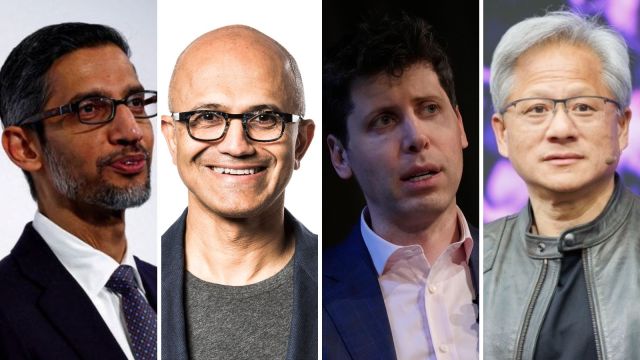DeepSeek shake-up: From Sam Altman to Elon Musk, Silicon Valley leaders react to Chinese AI startup rise
Here’s a round-up of what the tech industry has been saying about DeepSeek and its innovative, cost-efficient LLMs.
 Tech leaders Sundar Pichai, Satya Nadella, Sam Altman, and Jensen Huang. (Express Image)
Tech leaders Sundar Pichai, Satya Nadella, Sam Altman, and Jensen Huang. (Express Image)DeepSeek continues to garner attention from around the world, including Silicon Valley leaders, AI experts, and tech investors.
Founded in 2023, the Chinese AI startup has been thrust into the spotlight after it claimed that its recently launched open-source, reasoning model called DeepSeek R1 has “performance comparable” to large language models (LLMs) developed by US rivals such as OpenAI, Google, and Meta.
Its unconventional approach to building open-source AI models using less cash and fewer GPUs, is essentially why it has become the talk of town.
The result? A broader sell-off in tech stocks across markets from New York to Tokyo, with chipmaker Nvidia’s share price witnessing the largest single-day decline (nearly $600 billion cut in market cap) for a public company in US history on Monday.
Here’s a round-up of what the tech industry has been saying about DeepSeek and its innovative, cost-efficient LLMs.
Nvidia
Nvidia called DeepSeek’s R1 model “an excellent AI advancement,” despite the Chinese startup’s rise to prominence causing the chip maker’s stock price to dip by 17 per cent on Monday.
“DeepSeek is an excellent AI advancement and a perfect example of Test Time Scaling. […] DeepSeek’s work illustrates how new models can be created using that technique, leveraging widely-available models and compute that is fully export control compliant,” Nvidia said in a statement.
“Inference requires significant numbers of NVIDIA GPUs and high-performance networking. […] We now have three scaling laws: pre-training and post-training, which continue, and new test-time scaling,” an Nvidia spokesperson was quoted as saying by CNBC on Monday.
Since 2022, the US government has imposed restrictions on the export of AI hardware to China. These export controls have been openly criticised by Nvidia in the past. Despite the lack of access to the latest AI hardware, DeepSeek developed AI models rivaling o1 and Gemini using far lesser Nvidia chips than its US counterparts.
In its statement, Nvidia confirmed that DeepSeek’s AI technology was “fully export control compliant.” This comes after Scale AI CEO Alexandr Wang told CNBC last week that he believed DeepSeek trained its AI models using GPUs that are banned in China. But DeepSeek has maintained that it used Nvidia GPUs such as H20 and H800 chips that are specially designed to navigate US export controls and to be sold in China.
OpenAI’s Sam Altman
OpenAI CEO and co-founder Sam Altman praised DeepSeek R1 as an “impressive model” especially for “what they’re able to deliver on price.”
“We will obviously deliver much better models and also it’s legit invigorating to have a new competitor! we will pull up some releases,” he added, continuing that he looks forward to “bringing you all AGI and beyond.”
deepseek’s r1 is an impressive model, particularly around what they’re able to deliver for the price.
we will obviously deliver much better models and also it’s legit invigorating to have a new competitor! we will pull up some releases.
— Sam Altman (@sama) January 28, 2025
Earlier this month, OpenAI previewed its first real attempt at a general purpose AI agent called Operator, which appears to have been overshadowed by the DeepSeek focus.
Microsoft’s Satya Nadella
Nadella asserted that DeepSeek’s success is good for the entire tech industry. “Jevons paradox strikes again!” Nadella wrote on LinkedIn on Monday, referring to a 160-year-old theory, suggesting that more efficient AI models will result in increased demand for the technology.
“As AI gets more efficient and accessible, we will see its use skyrocket, turning it into a commodity we just can’t get enough of,” Nadella said.
“To see the DeepSeek new model, it’s super impressive in terms of both how they have really effectively done an open-source model that does this inference-time compute, and is super-compute efficient. [..] We should take the developments out of China very, very seriously,” Nadella had said at the World Economic Forum in Davos, Switzerland, last week.
Meta’s Yann LeCun
Meta’s chief AI scientist also insisted that DeepSeek’s breakthrough is ultimately good news for the social media giant.
“To people who see the performance of DeepSeek and think: ‘China is surpassing the US in AI.’ You are reading this wrong. The correct reading is: ‘Open source models are surpassing proprietary ones,’” Yann LeCun said in a LinkedIn post.
“DeepSeek has profited from open research and open source (e.g., PyTorch and Llama from Meta). They came up with new ideas and built them on top of other people’s work. Because their work is published and open source, everyone can profit from it. That is the power of open research and open source,” he added.
Salesforce CEO Marc Benioff
“Deepseek is now #1 on the AppStore, surpassing ChatGPT—no NVIDIA supercomputers or $100M needed. The real treasure of AI isn’t the UI or the model—they’ve become commodities. The true value lies in data and metadata, the oxygen fueling AI’s potential. The future’s fortune? It’s in our data. Deepgold,” Benioff said in a post on X.
Deepseek is now #1 on the AppStore, surpassing ChatGPT—no NVIDIA supercomputers or $100M needed. The real treasure of AI isn’t the UI or the model—they’ve become commodities. The true value lies in data and metadata, the oxygen fueling AI’s potential. The future’s fortune? It’s… https://t.co/iWIrTri2ey
— Marc Benioff (@Benioff) January 27, 2025
xAI’s Elon Musk
Tech billionaire Elon Musk has largely been skeptical in his reaction to DeepSeek’s success. In his replies to posts on X, the White House adviser cast doubts about DeepSeek’s claims about the capabilities of its AI reasoning model R1. For instance, he replied to Salesforce CEO Marc Benioff’s post about the true value of AI being data and metadata with “Lmao, no.”
He also joined Scale AI CEO Alexandr Wang in claiming that DeepSeek may possess around 50,000 Nvidia Hopper GPUs. For context, Nvidia has confirmed that DeepSeek’s open-source AI technology is ” fully export control compliant”.
Anthropic’s Dario Amodei
In an interview with CNBC, Anthropic CEO Dario Amodei advocated for the US government to impose stronger export controls on AI chips. He said that he believes Chinese AI companies have more GPUs than expected.
“It’s been reported, at least, that they [DeepSeek] have a cluster of 50,000,” said Amodei. “I think if the United States can’t lead in this technology, we’re going to be in a very bad place geopolitically,” he added.







